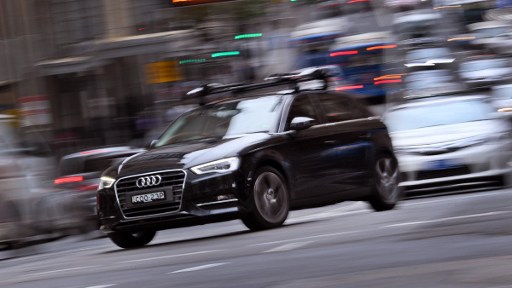
Australia’s consumer watchdog has launched court action against Volkswagen and its subsidiary Audi over an emissions cheating scandal, claiming they engaged in misleading or deceptive conduct. / AFP PHOTO / WILLIAM WEST
by Estelle PEARD
Agence France-Presse
GENEVA, Switzerland (AFP) — Volkswagen is on track for dealing with the recall of cars involved in the “Dieselgate” emissions scandal but, longer-term, needs to regain the trust of its customers, its chief executive Matthias Mueller said Tuesday.
His comments came as the EU and European consumer protection agencies hiked pressure on VW to fully compensate European clients over the affair.
The Dieselgate scandal erupted in September 2015 when VW admitted it had installed so-called “cheat” software in 11 million diesel-engine cars worldwide.
The device reduced emissions of harmful nitrogen oxides when it detected the vehicle was being tested.
Speaking to AFP at the Geneva Motor Show, Mueller said he was buoyed that the company had raced back into the black last year, despite the so-called Dieselgate scandal, with car-sales hitting an all-time high.
Profits at VW reached 5.1 billion euros ($5.4 billion) for 2016, after a stinging 1.6-billion-euro loss in 2015.
Volkswagen even became the biggest brand in car sales in volume terms, overtaking Japan’s Toyota.
“2017 should be a very good year,” Mueller told AFP.
“We are trying to put the diesel crisis behind us and regain the confidence of our clients,” the Volkswagen CEO added, in a sombre suit and tone of voice.
The group expects this year’s figures to be boosted by the arrival of the upmarket five-door Arteon, unveiled at the Geneva show.
The European car market as a whole notched up strong growth in 2016, with passenger car registrations climbing by almost seven percent. This year the market is expected to be flat, said Mueller.
– Repercussions –
Former Porsche boss Mueller took the Volkswagen helm from Martin Winterkorn in September 2015.
Eighteen months on he is still grappling a wide range of repercussions from Dieselgate, ranging from reputational damage to setting aside more than 22 billion euros to deal with fines and demands for compensation.
The recall of vehicles fitted with the emissions monitors is continuing on schedule, according to Mueller.
“In Germany, 65 percent of the cars involved have been fixed and in Europe as a whole, it’s around 50 percent,” he said.
“So we are very confident that we are putting things in order quickly and that we are going to rebuild trust in Volkswagen,” he promised.
He added that he saw no need “for the time being” to put aside additional funds to deal with future court cases.
Volkswagen has admitted fraud in both the United States and Germany, but investigators in both countries are still seeking to establish individual responsibility for the scandal.
Prosecutors in the German city of Brunswick announced last month that they were investigating Winterkorn for fraud, saying they had “sufficient indications” he knew about the cheating.
Mueller admitted on Tuesday that “serious errors were committed”.
“Our task now is to shed light on how this could have happened, and obviously who initiated it. Appropriate measures must be taken against these persons,” he insisted.
“Looking to the future, it is crucial that we set up procedures so that such a problem can never happen again. We are doing everything we can.”
– Disagreement with EU –
Volkswagen also faces problems from Brussels, with EU commissioner for consumer affairs Vera Jourova complaining that European customers who bought Dieselgate cars are not being treated as well as their US counterparts who have been offered generous compensation packages.
Jourova and representatives from consumer protection authorities in 22 European countries, meeting in Brussels on Tuesday, agreed on the need for coordinated action to help VW owners.
“The Dutch (consumer protection) authority will prepare a joint enforcement action,” EU Commission spokesman Christian Wigand said after the meeting.
“We expect concrete results from this process by end of next month,” he added.
Jourova “encouraged the authorities to use all the means at their disposal to protect European consumers”.
Mueller admitted that Jourova’s viewpoint and his own “are not compatible”.
“In the United States the laws are very different and the technical problems are different. The two situations are not comparable,” he added.
© Agence France-Presse







